ISLAMABAD: Despite an aggressive social media campaign, solar power consumers have failed to convince the National Electric Power Regulatory Authority (Nepra) to continue attractive profits on sales of surplus energy from their rooftop investments.
The energy regulator on Tuesday held a public hearing to provide an opportunity to solar investors to present their arguments against a proposed amendment to the Nepra (Alternative and Renewable Energy) Distributed Generation and Net Metering Regulations 2015.
The proposed amendment requires replacing the words ‘National Average Power Purchase Price (NAPPP)’ with ‘National Average Energy Purchase Price (NAEPP)’ in sub-regulation 5 of regulation 14.
The proposed change will cost the solar net metering distributor generators about Rs10.3 per unit. Because of the recent rebasing of the power tariff, the cost of the net metering electricity has reached Rs19.32 per unit and the amendment in the regulations will reduce it to Rs9 per unit. This price is paid by the distribution companies to the net metering distributor generators.
Nepra chief Tauseef H. Farooqui, who presided over the hearing, said the regulator had the powers under the law to change the NAPPP with NAEPP on its own but wanted to have larger representation from stakeholders through public hearings. He explained that there was no change proposed in net metering for self-consumption.
He explained at the outset that Nepra had provided the solar net metering regulators despite opposition from the government and power companies as a special initiative to facilitate consumers with ‘avoided cost’ through cheap self-generation of renewable energy and it was ‘not at all meant for sale of excess generation for profit making’ like independent power producers (IPPs).
Wapda and IPPs had a payback period of 25 years and above on their investments compared with a four-year payback period for rooftop solar generators and as the national average tariff increased, this period for residential solar reduced further.
The solar net metering “is our baby and we want it to grow and glow” but as a quasi-judicial entity, the regulator would not come under any pressure or social media campaign, he said.
“We not only have to look after the interest of 20,700 solar generator distributors but also required to protect with fairness the interest of the 36 million other residential consumers to have access to affordable and sustainable energy who are not so privileged and were compelled to buy power from the national grid,” he added.
Based on the current applicable power tariff of about Rs32 per unit (excluding taxes), a rooftop solar package of 10kw provided a payback period of 3.6 months, which was one of the most attractive investments in the country, another Nepra officer explained, adding the payback period further reduced after inclusion of taxes.
Therefore, there would be no limit on self-consumption or any additional cost and peak export of energy to power company would continue to be adjusted against peak import and offpeak export with offpeak import but in case of excess power, if sold to the rest of the consumers, solar generators would be treated as normal generators like IPPs.
Some solar power interveners advocated that the change would discourage solar promotion but could not defend their arguments with evidence, facts or legal arguments when repeatedly explained by Nepra members and staff as to why their return should be higher when even transmission and distribution facilities for them were being arranged by distribution companies resulting in Rs1.4 trillion annual capacity payments.
The regulator, however, agreed to examine legal arguments advanced by some of the interveners that the rates could not be changed before the expiry of their licences that were valid for up to seven years.
It was reported that a total of 464MW capacity of solar net metering (against 41,000MW of installed generation capacity on the national grid) was currently in place, involving Rs20,700 licence holders who sold 4.8m surplus units in August at a total return of Rs92m.
The Nepra asked the general public to file their further comments within seven days so that a learned judgment could be concluded.
Published in Dawn, September 29th, 2022













































